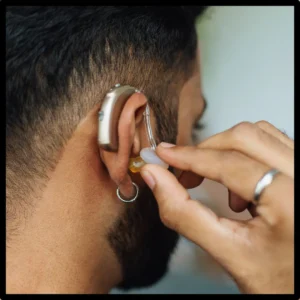8 Ways To Improve Your Hearing in 2025
Improving your hearing doesn’t just enhance your ability to listen; it enriches your life. By adopting better habits, scheduling checkups, and staying informed, you can keep your ears healthy and functioning well. Let’s explore eight actionable ways to improve your hearing in 2025.
1. Schedule Regular Hearing Tests
Getting a hearing test is a foundational step to improving your hearing health. Even if you think your hearing is fine, tests can identify issues early. Adults over 50 should get tested every two years, while younger individuals with risk factors should do so more frequently. Early detection can prevent further hearing loss and open the door to timely solutions.
Benefits of Regular Hearing Tests:
- Monitor changes in your hearing.
- Address issues early for better outcomes.
- Gain professional insights into maintaining ear health.
To improve your hearing health this year, book a test with a trusted hearing care provider.
Discover more about hearing tests.
2. Protect Your Ears from Loud Noises
Noise-induced hearing loss is preventable. Small changes in your routine can significantly reduce risks. For example, wear earplugs at concerts or while operating loud machinery. Noise-canceling headphones are another excellent option for reducing environmental noise exposure.
Tips to Protect Your Ears:
- Keep headphone volumes below 60%.
- Use ear protection in noisy environments.
- Take breaks from continuous loud noise exposure.
Investing in proper ear protection helps safeguard your hearing for years to come.

3. Maintain a Healthy Lifestyle
A healthy lifestyle directly supports better hearing by promoting the overall well-being of your ears and body. Regular exercise ensures proper blood flow to the inner ear, which helps maintain its delicate structures. Even small changes to your routine can make a big difference.
Exercise for Hearing Health:
Cardiovascular activities, such as walking, swimming, or cycling, improve circulation, delivering essential oxygen and nutrients to your ears. Stretching exercises, like yoga, not only improve blood flow but also reduce stress—a known aggravator of tinnitus.
Nutrition and Diet:
Incorporate hearing-friendly nutrients like omega-3 fatty acids (found in fish and walnuts), magnesium (from leafy greens), and zinc (from meat and legumes). These nutrients protect against age-related hearing decline and bolster your ear health. Vitamin A supports the immune system, while vitamin C fights free radicals that can damage your inner ear. Adding vitamin D to your diet helps maintain the bones and tissues in your ears.
Quit Smoking:
Smoking negatively impacts hearing by restricting blood flow to the inner ear. Quitting can prevent further damage and even improve existing hearing problems. Seek support programs if needed to make this life-changing adjustment.
Manage Stress:
Chronic stress affects both physical and auditory health. It can worsen tinnitus and make it harder to focus on conversations. Incorporate relaxation techniques like meditation or deep breathing into your daily routine to alleviate stress and support your hearing.
By prioritizing exercise, nutrition, stress management, and supplementation, you create a solid foundation for healthy hearing and overall wellness.

4. Upgrade Your Hearing Aids
Hearing aid technology has advanced rapidly. Modern devices offer noise reduction, Bluetooth connectivity, and rechargeable batteries. If you already use hearing aids, make 2025 the year you upgrade to a more advanced model.
Why Upgrade Your Hearing Aids:
- Enhanced sound clarity in noisy environments.
- Seamless integration with smartphones and smart devices.
- Improved comfort and convenience.
Talk to your hearing care provider about the latest hearing aid options tailored to your needs.
Find out more about selecting hearing aids.

5. Incorporate Vitamins into Your Diet
Certain vitamins and minerals can improve hearing health. Nutrients like folic acid, magnesium, and vitamin D support the delicate structures in your ear.
Key Vitamins for Better Hearing:
- Folic Acid: Supports blood flow to the ear.
- Magnesium: Protects against noise-induced hearing loss.
- Zinc: Strengthens your immune system, reducing ear infections.
Speak with your doctor before adding supplements to your routine to ensure safe and effective usage.
6. Practice Hearing Exercises
Hearing exercises can train your brain to process sound more effectively. These exercises help improve focus and sound recognition, especially in noisy environments.
Hearing Exercises to Try:
- Sound Localization: Identify the source of sounds in different rooms.
- Active Listening: Focus on specific instruments in music.
- Word Repetition: Listen to words and repeat them aloud.
These exercises not only sharpen your hearing but also enhance your auditory processing skills.
7. Address Earwax Build-Up
Excessive earwax can block sound waves, affecting your hearing. Regular cleaning and professional removal can restore clarity.
Tips for Managing Earwax:
- Avoid using cotton swabs; they can push wax further inside.
- Use over-the-counter ear drops for mild build-up.
- Seek professional earwax removal for severe cases.
Keeping your ears clean is a simple yet effective way to improve your hearing.
8. Reduce Volume and Take Breaks
Constant exposure to loud volumes strains your ears. Lowering device volumes and giving your ears time to rest can prevent long-term damage.
Steps to Lower Volume:
- Set volume limits on your devices.
- Use speakers instead of headphones when possible.
- Follow the 60/60 rule: listen at 60% volume for no more than 60 minutes.
By reducing strain on your ears, you can protect your hearing for the future.
Take Action Today
Your hearing health matters. Whether scheduling a test, upgrading hearing aids, or adopting healthier habits, each step makes a difference. We’re here to help you achieve your hearing goals. Contact Stanford Hearing today to schedule a consultation and start your journey to better hearing.
